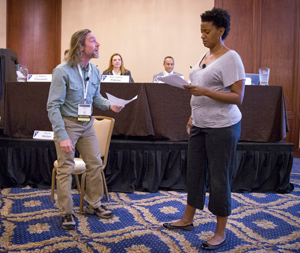Jokes and insults need to hit above the belt to not violate ethics

Actors David Weber (left) and Tiffany Porter acted out scenes during the “Thou Poisonous Bunch-Back’d Toad: Ethics of Insults Through the Centuries” session at the ABA Annual Meeting in San Francisco. Photo by Tony Avelar.
More than 100 lawyers and judges turned out Friday morning to listen to insults. They had some laughs; got some lessons; and learned some Shakespeare.
The program’s title indicated it would be entertaining: “Thou Poisonous Bunch-Back’d Toad: Ethics of Insults Through the Centuries,” and it did not disappoint. The Litigation Section’s presentation was held at the Palace Hotel during the ABA Annual Meeting in San Francisco.
The setting was a panel discussion, intertwined with partial scenes from Shakespeare’s Henry IV and The Merchant of Venice read by two professional actors, with minor roles filled surprisingly well by some lawyers from the audience (surely with a bit of rehearsal). After Prince Hal and John Falstaff hurl insults at each other with the ease of familiarity, moderator Gregory Hanthorn of Jones Day turned to the panel to interpret the context of wicked words.
The progression begins with Hal and Falstaff as friends who have a good relationship and can simply make fun of and with each other, says panelist Scott Reiser, a New Jersey attorney with Lum, Drasco & Positan LLC. “It’s how friends can communicate with each other, put each other down.”
But that can change with context, and over time, as it did in Shakespeare’s play.
“Insults don’t travel well across context,” says panelist Ioana Petrou, a Superior Court of California judge in Alameda County.
The greater problem now, Petrou adds, is privacy, or lack thereof. “Our private conversations can be made public, and we need to be cognizant of that,” she told the audience. Certain exchanges with friends and colleagues may seem innocuous, but when they’re recorded or taken out of context, or lifted from an email and forwarded, it might not work outside its intended audience.

J. Dalton Courson. Photo by Tony Avelar.
Panelist J. Dalton Courson, a New Orleans lawyer who is co-chair of the ABA Section of Litigation’s Civil Rights Litigation Committee, offered a war story: A few years ago, he had a high-profile hearing in federal court, his first time on a big case, in a full courtroom that included news reporters, and he was obviously nervous.
At one point the judge paused and asked him, “Mr. Courson, do you need some whiskey?” and later asked “do you want that whiskey now?”
“It was his way of breaking the ice,” Courson says, but if someone read the cold transcript, they might take it differently, which is the problem of context.
“I wouldn’t try to do any of this banter by email,” Courson says.
Judge Petrou took up the problem of transcripts, saying they’re just like emails, just words on paper; a lot is lost in translation. “So Above the Law could do a lot with it,” she says.
Another problem, which can be generational, is behavior and language that was once common but is no longer acceptable. Reiser mentioned a case in California in which an attorney told opposing counsel to stop interrupting her as she questioned a potential witness in a deposition. “Don’t raise your voice at me,” he told her. “It’s not becoming of a woman.” The man was sanctioned with a fine, Reiser says.

John Steele. Photo by Tony Avelar.
Panelist John Steele, a California solo practitioner and co-founder of the Legal Ethics Forum blog, says litigation is about attacking, albeit in a controlled way in a courtroom. He made an analogy to boxing. Before a fight begins, a boxing referee will call the opponents to center ring and say: “No hitting below the belt.” But the referee—or the judge—is not always present, such as in depositions.
“We have to instill interpersonal ethics for where that line is drawn and not hitting below the belt,” Steele says.
Follow along with our full coverage of the 2016 ABA Annual Meeting.



